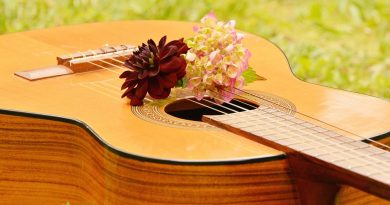Mastering Guitar Chords: A Guide to Developing Finger Independence
Mastering Guitar Chords: A Guide to Developing Finger Independence
As a guitarist, mastering guitar chords is essential to becoming a proficient player. Chords form the foundation of music and learning how to play them smoothly and accurately can greatly enhance your playing abilities. One of the key aspects of mastering guitar chords is developing finger independence. This skill allows you to play complex chord progressions and melodies with ease. In this guide, we will explore techniques and exercises to help you improve your finger independence and master guitar chords.
Understanding Finger Independence
Finger independence refers to the ability of each finger to move independently of the others. This is crucial for playing guitar chords, as it allows you to press down on multiple strings at the same time without inadvertently muting other strings. Developing finger independence requires practice and patience, but with time and dedication, you can improve your dexterity and coordination.
Exercises to Improve Finger Independence
1. Finger Isolation Exercise: One effective exercise for developing finger independence is the finger isolation exercise. Start by placing your fingers on the first four frets of the guitar, one finger per fret. Press down on each string with the corresponding finger and pluck the string to produce a clear sound. Repeat this exercise on each string, focusing on keeping your other fingers lifted and relaxed. This will help strengthen each finger individually and improve coordination.
2. Spider Exercise: The spider exercise is another great way to improve finger independence. Start by placing your index finger on the first fret, middle finger on the second fret, ring finger on the third fret, and pinky finger on the fourth fret. Play each fret in sequence, moving up and down the neck of the guitar. This exercise challenges your fingers to work independently and improves your ability to play complex chord shapes.
3. Chord Progressions: Practice playing different chord progressions to enhance your finger independence. Start with simple chords like C, G, and D, and gradually move on to more complex chord shapes. Focus on transitioning smoothly between chords and pay attention to the placement of each finger. This will help you develop muscle memory and improve your ability to play chords with accuracy and precision.
Tips for Mastering Guitar Chords
1. Start Slow: When practicing guitar chords, start slow and focus on accuracy and technique. It is better to play a chord correctly at a slower tempo than to rush through it and make mistakes. As you become more comfortable with the chords, you can gradually increase your speed.
2. Use a Metronome: A metronome is a great tool for improving your timing and rhythm when practicing guitar chords. Set the metronome to a comfortable tempo and play along with it, focusing on keeping a steady beat. This will help you develop a sense of timing and improve your overall playing skills.
3. Learn Songs: One of the best ways to master guitar chords is by learning songs that incorporate them. Choose songs that feature a variety of chords and practice playing along with the music. This will help you apply your chord knowledge in a practical context and improve your ability to play different chord progressions.
4. Seek Feedback: Finally, don’t be afraid to seek feedback from other musicians or instructors. They can provide valuable advice and guidance on how to improve your finger independence and master guitar chords. Additionally, watching tutorials and attending workshops can also help you refine your skills and take your playing to the next level.
In conclusion, mastering guitar chords requires practice, patience, and dedication. By developing finger independence and focusing on technique and accuracy, you can improve your playing abilities and become a proficient guitarist. Incorporate the exercises and tips mentioned in this guide into your practice routine and watch your skills flourish. Remember, it’s important to have fun and enjoy the process of learning and mastering guitar chords. Happy playing!






